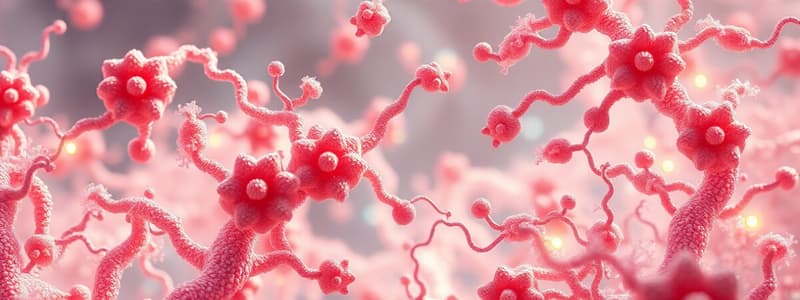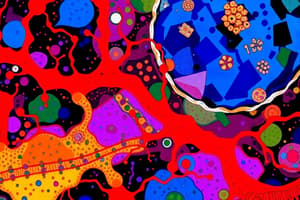Podcast
Questions and Answers
What is the primary function of the extracellular matrix (ECM)?
What is the primary function of the extracellular matrix (ECM)?
- Synthesizing new cellular components
- Providing support and strength (correct)
- Energy production for cellular processes
- Facilitating cell division
What distinguishes proteoglycans from glycoproteins?
What distinguishes proteoglycans from glycoproteins?
- Proteoglycans are primarily proteins with added sugars
- Proteoglycans are produced exclusively in the Golgi
- Proteoglycans do not bind to proteins
- Proteoglycans consist of long unbranched carbohydrate chains (correct)
In which cellular location does glycosylation of N-linked glycoproteins begin?
In which cellular location does glycosylation of N-linked glycoproteins begin?
- Cell membrane
- Nucleus
- Rough endoplasmic reticulum (correct)
- Cytoplasm
What is the composition of glycosaminoglycans (GAGs)?
What is the composition of glycosaminoglycans (GAGs)?
What type of linkage occurs for sugars in O-linked glycoproteins?
What type of linkage occurs for sugars in O-linked glycoproteins?
Which process involves ATP leading to the release of actin from myosin?
Which process involves ATP leading to the release of actin from myosin?
What is the main role of Na,K-ATPase in muscle tissues?
What is the main role of Na,K-ATPase in muscle tissues?
What causes the myosin heads to move during muscle contraction?
What causes the myosin heads to move during muscle contraction?
Which option correctly describes a feature of fast-twitch skeletal muscle fibers?
Which option correctly describes a feature of fast-twitch skeletal muscle fibers?
Where are stretch-activated calcium ion channels most likely found?
Where are stretch-activated calcium ion channels most likely found?
What type of cells are primarily responsible for producing the extracellular matrix (ECM) in cartilage?
What type of cells are primarily responsible for producing the extracellular matrix (ECM) in cartilage?
Which of the following statements about cartilage is FALSE?
Which of the following statements about cartilage is FALSE?
Which type of joint is characterized by having no joint cavity and being held together by dense connective tissue?
Which type of joint is characterized by having no joint cavity and being held together by dense connective tissue?
What is the function of the perichondrium surrounding cartilage?
What is the function of the perichondrium surrounding cartilage?
Which type of cartilage is found in intervertebral discs and the pubic symphysis?
Which type of cartilage is found in intervertebral discs and the pubic symphysis?
Which component of muscle connective tissue surrounds individual muscle fibers?
Which component of muscle connective tissue surrounds individual muscle fibers?
In which type of cartilage would you primarily find chondrocytes located in lacunae?
In which type of cartilage would you primarily find chondrocytes located in lacunae?
What characterizes brown adipose tissue compared to white adipose tissue?
What characterizes brown adipose tissue compared to white adipose tissue?
What is the role of the stratum corneum in skin health?
What is the role of the stratum corneum in skin health?
Which antiseptic is NOT suitable for a patient with a shellfish allergy?
Which antiseptic is NOT suitable for a patient with a shellfish allergy?
What is the primary function of sebum in the skin?
What is the primary function of sebum in the skin?
Which cells in the dermis are involved in the inflammatory response during wound healing?
Which cells in the dermis are involved in the inflammatory response during wound healing?
What condition is characterized by ineffective thermoregulation leading to cold extremities?
What condition is characterized by ineffective thermoregulation leading to cold extremities?
Which statement regarding normal skin flora is true?
Which statement regarding normal skin flora is true?
What type of skin is primarily associated with eccrine glands that do not sweat for cooling?
What type of skin is primarily associated with eccrine glands that do not sweat for cooling?
Which of the following symptoms can result from nerve dysfunction in the skin?
Which of the following symptoms can result from nerve dysfunction in the skin?
What is the primary role of osteoclasts in bone physiology?
What is the primary role of osteoclasts in bone physiology?
How does calcitonin affect osteoclast activity?
How does calcitonin affect osteoclast activity?
What hormone(s) increase the activity of osteoclasts?
What hormone(s) increase the activity of osteoclasts?
Which process do osteoblasts primarily stimulate?
Which process do osteoblasts primarily stimulate?
Which of the following statements about OPG is correct?
Which of the following statements about OPG is correct?
Flashcards are hidden until you start studying
Study Notes
Exam Preparation Strategies
- Focus on speaker notes from PowerPoint presentations for crucial information.
- Pay attention to phrases like "that would be a good test question" as they indicate potential exam content.
- Highlight major concepts; do not rely solely on presentation slides for comprehensive study.
Extracellular Matrix (ECM)
- Non-cellular component of tissues providing support, strength, and shock absorption through collagen and proteoglycans.
- Functions include adhesion and communication, produced predominantly by chondrocytes.
Glycoproteins and Proteoglycans
- Glycoproteins are primarily proteins with added short, branched carbohydrates (glycans).
- Proteoglycans are mainly composed of long, unbranched carbohydrates (glycans) attached to proteins.
Glycoprotein Synthesis
- N-Linked Glycoproteins: Glycosylation begins in the endoplasmic reticulum (ER) and is completed in the Golgi apparatus.
- O-Linked Glycoproteins: Glycosylation occurs exclusively in the Golgi apparatus.
- Transported to cell membranes, secretory vesicles, or lysosomes.
Glycosaminoglycans (GAGs) and Proteoglycans
- Proteoglycans consist of a core protein covalently bonded to GAGs, which are negatively charged heteropolysaccharide chains.
- Proteoglycan aggregates, the main component of cartilage ECM, form when multiple monomers associate with hyaluronic acid.
Cartilage Structure and Function
- Comprised of specialized connective tissue with cells, fibers, and ground substance without nerves, vessels, or lymphatics.
- Chondroblasts synthesize the ECM; chondrocytes reside within lacunae and are critical for maintenance.
- The perichondrium, made of dense irregular connective tissue, has two layers: outer fibrous and inner chondrogenic.
Joint Types
- Fibrous Joints: Include sutures (skull), syndesmosis (distal ends of long bones), and gomphosis (teeth).
- Cartilaginous Joints: Include synchondrosis (ribs, hyaline cartilage) and symphysis (intervertebral discs, fibrocartilage).
- Synovial Joints: Have an articular cavity with hyaline cartilage, fibrous capsule, and synovial membrane producing fluid for joint lubrication.
Muscle Tissue
- A motor unit consists of a lower motor neuron and its innervated skeletal muscle fibers.
- Connective tissue layers associated with skeletal muscle include endomysium (individual fibers), perimysium (fascicles), and epimysium (entire muscle).
Calcium Regulation in Bone Physiology
- Osteoblasts are responsible for bone formation, producing factors like RANKL and OPG.
- Osteoclasts resorb bone, are stimulated by RANKL, and inhibited by calcitonin, which lowers blood calcium levels.
- Vitamin D (Calcitriol) and parathyroid hormone (PTH) work to increase blood calcium, while calcitonin decreases it.
Skin and Immunity
- Epidermal Cells: Langerhans cells contribute to skin immunity; dermal macrophages and mast cells are part of the inflammatory response.
- Maintaining skin integrity is essential to prevent pathogen entry, aided by sebum and normal skin flora.
Thermoregulation Mechanisms
- Core body temperature is maintained through mechanisms involving apocrine and eccrine glands that are under autonomic control.
- Dysfunction, such as Raynaud's phenomenon, can impair blood flow to extremities in cold conditions.
Nail Anatomy
- Understanding nail anatomy includes prefixes and suffixes: "onycho" (nail), "lysis" (breaking), "myco" (fungus).
Study Resources
- Utilize interactive tools, such as Kahoot, for engaging review of material.
Studying That Suits You
Use AI to generate personalized quizzes and flashcards to suit your learning preferences.




